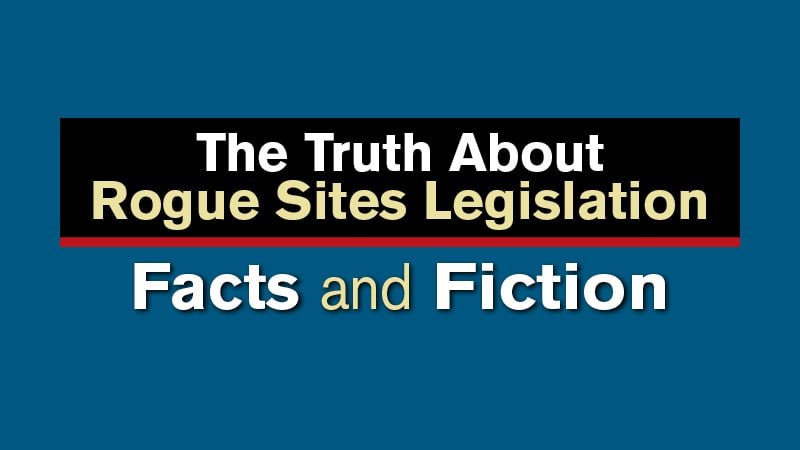Each day, foreign illegal websites generate millions of dollars selling goods, services or content that were either stolen or counterfeited from U.S. companies. These “rogue websites” receive more than 53-billion hits each year and operate overseas without fear because they are not subject to U.S. law enforcement. They don’t pay U.S. taxes, contribute to the U.S. economy, provide U.S. jobs or manufacture creative content. But they are able to operate and are made possible because U.S. advertisers, credit card companies, search engines and domain name system server operators give them access to the American public.

Illegal offshore websites threaten U.S. employers and consumers. They often appear legitimate, so consumers don’t realize when they are visiting an illegal website or purchasing stolen or counterfeit goods. Rogue websites steal identities, sell personal information, install malicious software and sell substandard or dangerous counterfeit goods, such as defective medical devices, pharmaceuticals, military goods and other hard goods. People have lost their jobs, been sickened and even died as a result of rogue websites.
It’s time to fight back against the foreign criminals who profit by stealing the ingenuity that makes the United States great. Don’t be misled by the frantic efforts of a few search engines and technology companies that make money by doing business with rogue websites.
The FACT is this: Rogue Sites Legislation protects you, your job, your personal information and your family.
For more information on the fight against Internet Theft please visit www.creativeamerica.org.
FICTION: Rogue Sites legislation benefits corporations at the expense of average citizens
FACT: Nothing could be further from the truth. Rogue sites legislation protects U.S. jobs and consumers from foreign criminals who steal or counterfeit U.S. intellectual property. When stolen U.S. content and goods are sold on the Internet, the people who work in the industries that produce those products are the ones most immediately and directly impacted. This legislation protects the jobs, pensions and health care coverage of those American workers, in addition to protecting consumers from dangerous and defective counterfeit goods. As a result, bi-partisan rogue sites legislation is supported by most major U.S. unions, over 400 companies and associations, 43 Attorneys General, major law enforcement organizations, the U.S. Conference of Mayors and many U.S. governors. This legislation protects average Americans, making their jobs more secure and improving consumer protections.
FICTION: Rogue sites legislation will cause websites like Netflix and iTunes to go out of business
FACT: To the contrary, domestic websites like Netflix, iTunes, Vudu, Amazon and many others, which sell U.S. goods legally, stand to benefit from the legislation. Legal websites like Netflix and iTunes lose business and revenue to foreign websites that counterfeit or sell goods illegally and at artificially low prices – low prices made possible because those rogue sites have not invested a single dollar into the creation of the content and goods they steal and sell. In fact, many Internet and technology companies, including Netflix, have expressed support of the legislation.
FICTION: Rogue sites legislation will stifle innovation
FACT: It is true that foreign businesses have developed innovative ways to steal or counterfeit U.S. intellectual property. But is this the kind of innovation our government wants to encourage? Of course not! Rogue sites legislation encourages the right kind of innovation by ensuring companies and inventors can recoup the investment of time, energy and creativity they pour into new companies and ideas. In other words, it encourages innovation by enabling American creators to get paid for the work they do. As Steve Jobs is quoted in his recent biography by Walter Issacson, “If intellectual property begins to disappear, creative companies disappear or never get started.”
FICTION: Rogue sites legislation relies on “DNS filtering,” which will break the Internet
FACT: The DNS filtering described in the legislation is already used to protect consumers in many different ways, including to combat spam, phishing, malware, viruses and other forms of Internet crime. Many large ISPs use filtering to protect their customers from websites known to be the source of dangerous activity, as do corporations and governments. As an added precaution, the legislation makes very clear that a court cannot issue an order that would harm DNS. The fact is that DNS filtering has been used for years. The Internet is doing just fine.
FICTION: Rogue sites legislation is censorship! It violates the right to free speech! It, it … it, yeah!
FACT: Stealing is not – and never has been – free speech. Selling illegal, counterfeit or stolen content is not free speech. And preventing foreign criminals from engaging in the theft and sale of U.S. intellectual property is not censorship. To the contrary, protecting copyright encourages free speech by protecting its creators from the theft and misuse of their work.
“Censorship” is a word used by opponents of rogue sites legislation to create fear, but this legislation is unrelated to censorship. Repressive regimes seek to control the Internet by stifling communications and expression contrary to their political or ideological beliefs. Such censorship has nothing to do with laws to prevent the counterfeiting or wholesale theft of U.S. property by foreign criminals. As noted first Amendment scholar Floyd Abrams said in a recent Washington Post Op Ed, “Chinese dissidents do not yearn for freedom in order to download pirated movies.”
FICTION: Even if it’s Constitutional, rogues sites legislation is un-American and it stifles free expression
FACT: Among the strongest supporters of rogue sites legislation are the creators of original and creative content, including major creators’ guilds and unions. These groups have fought for freedom of expression for generations, including through periods of government blacklisting and censorship, and they understand better than anyone the critical importance of free and creative expression. And that’s precisely why they support rogue sites legislation – because it will promote the free and creative expression of ideas in the United States without limit. Nothing could be more quintessentially American. It’s worth noting that the very same groups who allege the legislation stifles free expression are themselves engaged in the systematic censoring and blacklisting of people and groups that support the bill. Cyber-terrorists have attacked the websites and records of the legislation’s supporters, and have organized “blacklists” against companies who speak in its favor. A number of businesses have become afraid to speak up in support of the legislation based on threats of cyber retaliation. Despite opponents’ lip service to “free speech,” their actions speak louder than words.
FICTION: Rogue sites legislation violates due process
FACT: Rogue sites legislation provides the exact same due process protection provided to every individual who appears before a U.S. Court. The legal procedures described in the legislation are identical to those used to combat an assortment of illegal activity, from copyright infringement to trespassing.
FICTION: Rogue sites legislation will cost our government too much money to enforce
FACT: Citizens are understandably concerned with government spending. However, rogue sites legislation could be a net gain for the U.S. economy. It protects and promotes U.S. jobs and encourages consumer spending on authentic and legal U.S. goods. The current theft of American jobs and property by illegal foreign websites is analogous to trucks rolling up to U.S. banks and stealing billions of dollars, and the revenue of U.S. businesses must be protected for the nation’s economy and financial condition to improve. In other words, the government can’t afford not to enact rogue sites legislation.
FICTION: Rogue sites legislation will shut down the Internet’s most popular websites, like YouTube and Facebook
FACT: Opponents of rogue sites legislation have tried to “scare up” opposition by claiming that popular sites like YouTube and Facebook will be subject to the bill. These allegations are flat-out false. Rogue sites legislation targets only foreign websites that sell unlicensed, unregulated and unsafe stolen or counterfeited products to U.S. consumers.













